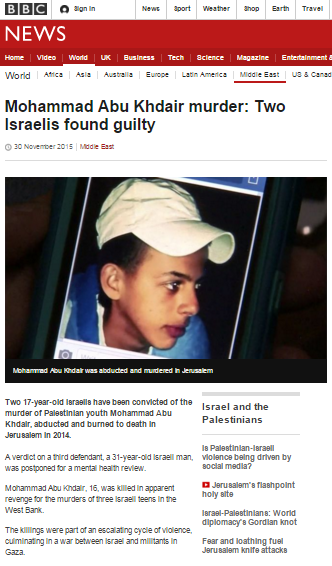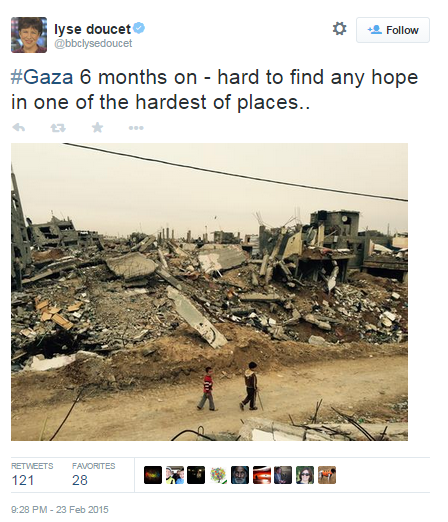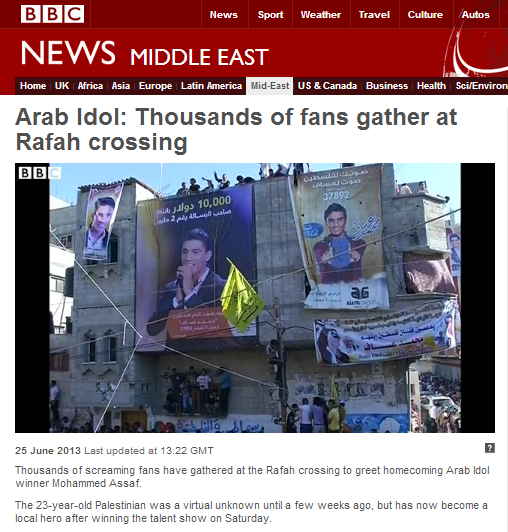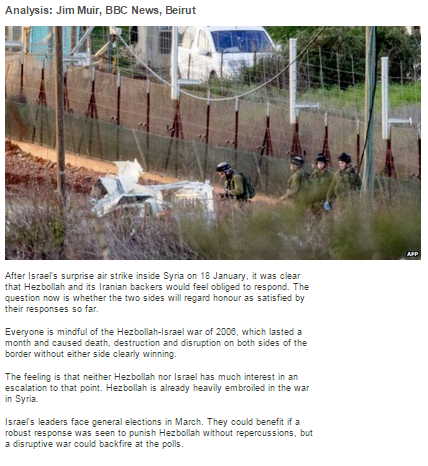On November 30th the BBC News website published an article titled “Mohammad Abu Khdair murder: Two Israelis found guilty” on its Middle East page. The article has undergone numerous amendments since its initial publication and the changes made to one paragraph in particular are of interest.
The first two versions of the report told readers that:
“The murder of 16-year-old Mohammad Abu Khdair fuelled spiralling violence between Israel and Palestinians which led up to a war with militants in Gaza.”
Later, that passage was amended to read as follows:
“Mohammad Abu Khdair, 16, was killed in apparent revenge for the murders of three Israeli teens in the West Bank.
The killings set off an escalating cycle of violence, leading to a war between Israel and militants in Gaza.” [emphasis added]
Still later, more amendments were made and the version currently available reads:
“Mohammad Abu Khdair, 16, was killed in apparent revenge for the murders of three Israeli teens in the West Bank.
The killings were part of an escalating cycle of violence, culminating in a war between Israel and militants in Gaza.” [emphasis added]
The BBC began promoting the erroneous notion of a “cycle of violence” as the cause of the conflict of summer 2014 even while the hostilities were still going on. In August 2014, for example, BBC audiences were told that:
“Israel accused Hamas of responsibility for the disappearance of Naftali Frenkel, Gilad Shaar and Eyal Yifrach and launched a crackdown on the group in the occupied West Bank, detaining hundreds of members despite Hamas denying any involvement.
Then on 2 July, a Palestinian teenager from East Jerusalem was abducted and burned alive in an apparent revenge attack two days after the bodies of the Israeli teenagers were found. The killings set off an escalating cycle of violence and led to the current conflict in Gaza.”
In September 2014 BBC audiences were told that:
“The abduction of the teenagers was a trigger of the recent conflict in Gaza.[…]
Israel launched a crackdown on Hamas in the West Bank following the abduction, detaining hundreds of members.
Then on 2 July, a Palestinian teenager from East Jerusalem was abducted and burned alive in an apparent revenge attack two days after the bodies of the Israeli teenagers were found. One Jewish man and two youths have been charged with the murder of Mohammed Abu Khdair, 16.
The killings set off an escalating cycle of violence, leading to a 50-day conflict between Israel and Palestinian militants in the Hamas-dominated Gaza Strip that claimed more than 2,000 lives.”
In January 2015, BBC audiences were again informed that:
“The teenagers’ murders in June set off an escalating cycle of violence and led to a 50-day conflict between Israel and Palestinian militants in Gaza.”
Like those previous reports, this latest one’s framing of the summer 2014 conflict as having been brought about by a “cycle of violence” erases the real cause of the hostilities. As has been noted here before:
“In the weeks which preceded Operation Protective Edge attacks from the Gaza Strip escalated with 52 missiles fired during June 2014 and 237 missiles and dozens of mortars fired in the first week of July – eighty of them on July 7th alone.”
That escalation in missile fire from the Gaza Strip began immediately after the disappearance of the Israeli teenagers on June 12th and continued throughout the three weeks of search and rescue operations.
It was of course that incessant missile fire on Israeli civilians – which is repeatedly erased by the BBC in its portrayal of events – that was the reason for the military operation, with the later discovery of dozens of cross-border tunnels prompting the subsequent ground operation. The military operation could have been avoided had Hamas elected to take advantage of the ample opportunities it was given to stop the missile fire before July 8th 2014, but the terrorist organisation chose not to do so – for reasons by no means exclusively connected to Israel.
“A Hamas official, who did not give his name to Palestinian news agency Sawa, said overnight Friday-Saturday [July 4th /5th 2014] that “those who expect Hamas to stop the rocket fire [on Israel], should to turn [Palestinian Authority Prime Minister] Rami Hamdallah.”
The official was alluding to the fact that the salaries of 40,000 Hamas clerks in Gaza were still unpaid, which was reportedly a key Hamas demand since agreeing to a unity government deal in late April with the Palestinian Authority.”
There is unfortunately nothing novel about this article’s promotion of the erroneous notion of an irresistible “cycle of violence” but such framing of events materially misleads BBC audiences with regard to the real causes of the conflict of summer 2014 and the fact that it could have been prevented had Hamas so chosen. It is of course worth remembering that this inaccurate portrayal will become part of the “historical record” available to the public.




